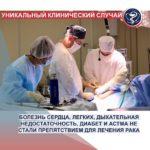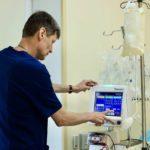Cancer treatment with concomitant pathologies: the story of Olga Valentinovna
HEART, LUNG DISEASE, RESPIRATORY FAILURE, DIABETES AND ASTHMA DID NOT BECOME AN OBSTACLE TO CANCER TREATMENT
Olga Valentinovna is a teacher, she was always attentive to her health and tried not to miss medical examinations. This year, as always, she underwent an examination, and during it she complained to the doctors about pain in the lumbar. The doctor recommended an ultrasound, and its results shocked the woman with a tumor in her left kidney. Olga Valentinovna was sent for a consultation to a urological oncologist, who hastened to reassure: “The tumor is operable, we will prepare for the operation.”
Olga Valentinovna had to undergo a series of examinations, as well as consultations with an anesthesiologist and cardiologist. And it was at this stage that new obstacles awaited her, delaying treatment indefinitely. The patient had serious comorbidities of heart disease, pulmonary disease, respiratory failure, diabetes and asthma. Olga Valentinovna’s treating doctor decided to seek help from colleagues at the National Center and sent a request for a telemedicine consultation to the A. Tsyb MRRC – branch of the Federal State Budgetary Institution of the “National Medical Research Radiological Centre” of the Ministry of Health of the Russian Federation. This is because it has accumulated unique experience in providing assistance to cancer patients with serious concomitant pathologies.
As the head of the department of anesthesiology and resuscitation, Professor Alexander Potapov, notes, neither age nor other factors should become a reason for refusing a patient to undergo surgery. “For many, even the most severe cases, you can find an approach and the correct anesthesia; it is only important to take into account all the factors. And such complex clinical cases are the prerogative of federal centers.”
After the telemedicine consultation, Olga Valentinovna received an invitation to a consultation with specialists from the National Medical Research Radiological Centre. Here, the patient underwent an in-depth examination of the function of the cardiovascular and respiratory systems using a cardiorespiratory stress test, and the condition of the upper respiratory tract, which were changed after a previous operation on the thyroid gland, was assessed. As a result, the specialists were able to identify the leading risk factors for potential complications and develop a plan for the most effective and safe anesthesia care.
A month later, Olga Valentinovna was ready for the long-awaited operation. She underwent a laparoscopic nephrectomy, which is a minimally invasive surgery through several small incisions. And after a few days the woman was able to return home to her favorite job with her students. “I am a class teacher, my guys knew about the disease and were very supportive! I looked at them and realized that I had to fight to the end, not give up, knowing that I had a chance to get all the necessary treatment to defeat cancer!”






